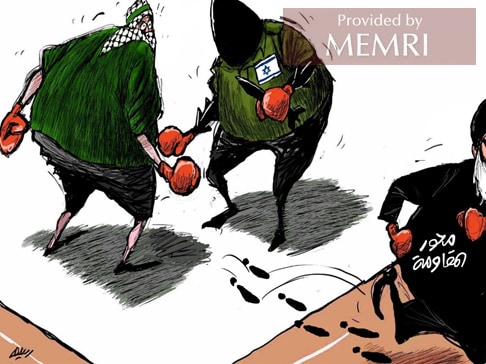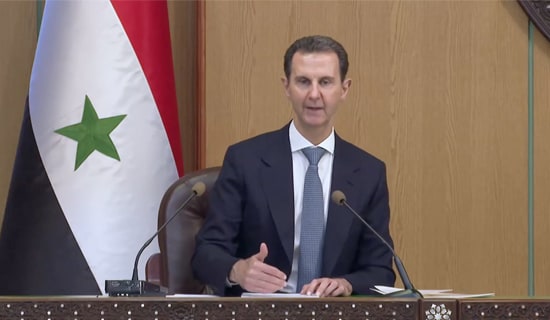Recent articles in the Saudi press accuse Iran of involvement in Hamas' October 7 attack in southern Israel, in which some 1,200 people were murdered and about 240 were kidnapped.[1] The articles claim that Iran is not to be believed when it says it was not involved in the attack, because evidence actually suggests that high-ranking figures in the resistance axis coordinated the launch of this attack. Stating that Iran is using the Palestinian cause to its own ends, they add that the October 7 attack was meant to thwart the Saudi-led efforts towards peace and normalization in the region. Unlike Iran, they say, Saudi Arabia and its camp in the Arab world are the ones who are actually promoting the Palestinian cause, and it is time to adopt a realistic and rational solution to the Palestinian issue, far from the illusions marketed by Iran.

Cartoon in Saudi daily: "Resistance axis" runs away, leaving Israel and Hamas to fight each other (Al-Sharq Al-Awsat, London, October 25, 2023)
The following are translated excerpts from these articles:
Saudi Journalist: The October 7 Attack Was Meant to Undermine Regional Peace
In a November 3, 2023 article on the news site Elaph, Saudi writer and journalist Dr. Muhammad Nahed Al-Quaiz stated that all evidence indicates that the entire resistance axis, headed by Iran, was involved in planning the October 7 attack, with the aim of torpedoing the peace efforts, but later left Hamas alone in the fray. He wrote: "Hamas and its followers chose to join the camp that has destroyed four Arab countries in the name of liberating Jerusalem, namely the axis of Iran, Hizbullah, Syria and Al-Hashd [Al-Sha'bi, i.e., the Popular Mobilization Units in Iraq].
"…This resistance axis and its mercenaries in the media started hurling accusations at Saudi Arabia and maligning it for pursuing the just path of peace, calling the peace talks 'normalization.' [Then] the so-called resistance axis – [the axis of] false resistance – agreed to arm and support Hamas in order to destroy this peace track. All evidence indicates that [figures] at the highest level [of the resistance axis] coordinated the launch of Operation Al-Aqsa Flood [Hamas' name for the October 7 attack], whose goal was one: to torpedo the peace process without offering any alternative or considering the consequences, namely the death and devastation brought upon the people of Gaza…
"Upon the outbreak of Operation Al-Aqsa Flood, Iranian President Ebrahim Raisi issued a statement that exposed the [hidden] truth, saying: 'The entire normalization policy has suffered an enormous defeat, and in practice no longer exists.' But then something happened that Hamas did not plan for: Iran, Hizbullah and Al-Hashd Al-Sha'bi left it [alone in the fray]…
"Gaza wrote the most powerful message in the blood of its children, women and unarmed [civilians], namely that there can be no sympathy for those who falsely purport to wage resistance, those who traded in the cause of [liberating] Jerusalem, or the media mercenaries who attacked Saudi Arabia."[2]
Senior Saudi Journalist: It Is Unlikely That Iran Did Not Know About The October 7 Attacks In Advance
Tariq Al-Homayed, the former editor of the London-based Saudi paper Al-Sharq Al-Awsat, wrote that Iran is trying to persuade the world that it did not know about the October 7 attack in advance, in order to ensure itself a seat in any future talks about Gaza's fate. However, he said, believing that "Tehran is oblivious to the actions of its militias in the region is akin to believing that anyone could increase their credit card balance without the bank noticing," he said. The following are excerpts from his article as it appeared on the English-language edition of Al-Sharq Al-Awsat.[3]
"It is clear that Iran's current objective is to get a seat at the next negotiation table, irrespective of where negotiations will be held or what is discussed, be it the release of Israeli hostages or ending the war in Gaza. At the same time, it wants to ensure that the infrastructure of Hamas’s power is not severely undermined and that Hezbollah is not dragged into the conflict.
"Thus, Tehran insists that it had not known about the October 7 operation. Hassan Nasrallah began his speech on Friday by denying that either Iran or his party had been told about the attack, claiming that the 'resistance movements' in the region and the 'leaders of the resistance' make their own decisions.
"In my opinion, believing that Iran had been unaware that Hamas and Al-Qassam would launch the operation on October 7 - even privy to the minute details - or that Tehran is oblivious to the actions of its militias in the region, is akin to believing that anyone could increase their credit card balance without the bank noticing.
"The international community, after Israel, could perhaps come to accept the idea that Iran was not involved, in order to avoid an escalation in the region. This sentiment resonates internationally, and especially in Israel, as no one wishes to broaden the scale of military confrontations.
"Indeed, Iran does not wish to sacrifice Hezbollah. Its primary objective is safeguarding Tehran and its interests, not resolving the Palestinian question or any other matter. Tehran cannot tolerate the idea of Hezbollah fighting a war at present, especially given the naval fleets that the US and others have sent to the Mediterranean.
"Iran is also well aware that any genuine military action from the Syrian front would change the dynamics there, potentially severing supply lines from Iraq to Syria. Above all, Iran's gravest concern is that any military escalation could end with the collapse of the Syrian regime.
"Therefore, Iran's objective is to avoid clashing with Israel and the broader international community…
"Moreover, Iran wants to avoid a change to the status quo that removes Hamas from power in Gaza, especially through the establishment of interim international authorities that eventually hand over the Strip to the Palestinian Authority. Iran wants to be represented in any future negotiations on this matter…
"The last thing Iran wants is a tactical defeat. It does not want to lose one of its key assets of disruption in the region or its seat at the negotiating table that could reshape the status quo and, consequently, the fundamental strategic balance.
"Tehran does not want everything to end with the reinvigoration of the peace process that could lead to a two-state solution. Ismail Haniyeh endorsed this outcome last Wednesday, to the astonishment of all the parties concerned.
As a result, we have seen this campaign of trying to deny that Iran had known about the operation amid empty Iranian statements about the mendacious 'Axis of Resistance.'"
Saudi Writer: The Palestinians, Abandoned By The Resistance Axis, Must Understand That Only The Arab States Can Help Them
On his column in the Al-Madina daily, Saudi journalist Ahmad Al-Zafiri wrote that the Palestinian factions must understand that Hizbullah and the resistance axis have abandoned them, and that the alliance with this axis has brought them nothing but death and destruction. Therefore, he argued, these factions will be better served by aligning themselves with the Arab states. He wrote:
"What did they expect, those people who waited for [Hizbullah Secretary-General] Hassan Nasrallah's [speech], and especially those who believed that there was an axis that would [jointly] fight against Israel?! Nasrallah began his speech by publicly shaking himself free of [Operation] Al-Aqsa Flood, in order to spare his organization from the shame [of not joining the war]. This is all we expected of [Hizbullah, which is] a party of empty slogans and made-up stories of heroism.
"The Palestinians are currently dealing with a harsh war being carried out by an aggressive war machine supported by the West. At this point, the Palestinian politicians must understand the importance of their political unity. Some of them must reassess the considerations that led them to form alliances which brought the Palestinian people nothing but death and destruction. Today, the only realistic solution is working jointly with the countries of the Arab sphere…
"The imaginary resistance axis has given up on supporting those who expected it to stand by them militarily [in the war], since it has more important considerations than Palestine: it wants Baghdad, Damascus, Beirut and Sana'a. The Arabs are the only ones that have supported the Palestinian people politically. Saudi Arabia has played and continues to play an important role in influencing global public opinion in order to stop this war, which is harming civilians… Saudi Arabia and the Arabs will not give up on Palestine and its people, but it is important that some of [the Palestinians] reassess their considerations and understand that their path lies with their true brothers, not with those who sell illusions."[4]
Saudi Journalist, Hinting At Iran: The Concept Of The Resistance Cannot Be Implemented In Palestine; Foreign Elements Are Exploiting The Palestinian Issue
Al-Riyadh columnist Dr. Ali Al-Khashiban hinted that Iran and the resistance axis are exploiting the Palestinian issue to their own ends, which could harm the Palestinians' rights and cause. He added that the Palestinian issue needs a rational solution that will lead to stability.
He wrote: "…History has proven that the [Palestinian] cause now needs a different solution, and even that… the idea of resistance cannot be implemented in this land, due to changes in international political factors and due to the ideological reality. The regional developments and crises that have affected the Arab world since 2010 have had an impact not just on the Palestinian issue but on the entire region and its national security plans. This enabled greater intervention by countries and organizations that are not part of the [Palestinian] issue – foreign political [elements] that are exploiting [the situation]. These elements know that they cannot provide any meaningful support to the [Palestinian] cause today, except for slogans…
"The perception of the Palestinian cause is very confused. A large crack formed in it, which enabled interest-driven elements to intervene and exploit it, and this has contributed to the fundamental change in the character of the Palestinian issue… The confusion and chaos among the Arab public regarding what is taking place in Palestine are caused by the negative exploitation [of the matter], which could eventually bring an end to the rights of the Palestinians. This situation requires us to reassert the nature of the Palestinian cause by means of countries that have a stable stance and that realize that the two-state solution is the best Arab solution to the issue, which is entering its eighth decade without having made any progress. In fact, [the magnitude] of the losses it has sustained, compared to the progress made, is very alarming…
"The Palestinian issue needs solutions that match rational expectations, since the region needs stability. Otherwise, the only option is instability, escalation of the conflict, and the appearance of new consumers [to exploit] the crises and problems of the region."[5]
[1] On criticism of Hamas in Saudi Arabia in the context of the October 7 attack, see MEMRI reports: Special Dispatch No. 10833 - Saudi Journalist: The Hamas Attack Will Have Devastating Results; It Harms The Palestinians And Serves Only Iran – October 8, 2023; Special Dispatch No. 10884 – Saudi Journalists Slam Hamas: It Commits Atrocities, Brings Disaster Upon Palestinians To Serve Iran And Thwart Peace, October 18, 2023; Special Dispatch No. 10901 – Article In Saudi Daily: The Hamas Attack Was A Suicide Operation Against Innocent Women And Children, Aimed At Thwarting The Plans For Regional Peace And Development , October 24, 2023.
[2] Elaph.com, November 3, 2023.
[3] English.aawsat.com, November 5, 2023.
[4] Al-Madina (Saudi Arabia), November 4, 2023.
[5] Al-Riyadh (Saudi Arabia), November 6, 20233.




